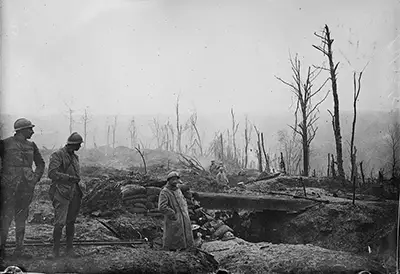Battle of Verdun
German Backstory
The German siege of Verdun was considered the longest battle of World War I, and was important to all sides. Germany considered the key to winning the war was firmly prioritized by taking control of the Western front with France. Their reasoning was solid, as it looked like Russia was on the verge of withdrawing from the war. So the fight need not be brought to them, as they would take care of themselves.
As for trying to crush France, this would also take care of their allies as Britain would be more open to seeking terms with Germany. If they refused, they too would be defeated, as there forces would be severely crippled after the defeat of the allied forces with France.
That didn’t mean Britain wasn’t a threat, and was considered far from it. The Germans hatched a plan to keep Britain busy by using unrestricted submarine warfare against all merchant shipping, with the intention of starving Britain out.
This, combined with the siege against Verdun on February 21st 1916, became a big opportunity for the Germans. Even with the fortifications of Verdun, the French Army was badly outnumbered. Over 1 million German troops were in on the attack, but the bombardment only led to them capturing the French front line trenches.
The Germans who had the numbers still had to claw their way to a victory, slowly taking down one fort at a time and pushing the French forces backwards. They faced more resistance than expected, and eventually resorted to chemical warfare in the form of phosgene gas.
Even with the use of their secret weapon, the defense first measures of Germany against the fortified Verdun led to an eventual loss and retreat by the Germans. Several demotions and promotions on each side took place, and at one point Germany had the French right where they wanted them.


France Backstory
The biggest decider for France sticking with the attack was political in nature, and not due to giving up a huge tactical advantage. The French people and Army viewed Verdun as a huge symbol in their country, with its strong defenses that were boosted since the Franco-Prussian war of 1870-1871. As Verdun was considered a sentimental icon to the French, it was these same sentiments that German Chief of Staff Erich von Falkenhayn would play on to lure them into a defeat.
The plan was to take the undermanned fortress forcing the French to defend it and deplete their own forces. Staying in Verdun was not purely for political reasons, as German occupancy would open up attack lines to the French on three sides at once.
The beginning attacks were heavy against the undermanned fortress, with 200,000 French troops going against 1 million German troops. Even when most of Verdun was captured, retreating would have destroyed France politically and was not even considered an option.
Constant communication by the French and an overly defensive strategy by the Germans led to Germany withdrawing, after suffering equal losses to the French.

Why Was the Battle of Verdun Important?
For Germany it was an easy way to wipe out hundreds of thousands of French troops without any losses on their side. Capturing Verdun would also have destroyed the morale of France, while also giving Germany prime attacking position if they chose to advance forward.

Who Was Affected?
Germany was affected the most, as their strategy led to an almost equal loss of life with the French, even though they had the numbers. Over 434,000 German lives were lost and 550,000 French lives. The additional reinforcements that arrived during the attack for the French very much kept them in the battle.

Names to Remember
Erich von Falkenhayn was born in 1861, and laid out the plan to attack Verdun and overtake the French to win the war. It was also under his recommendation that all merchant ships be attacked in enemy waters.
Crown Prince Wilhelm was born in 1882 and was the leader of German Fifth Army. His original plan to attack Verdun from both sides of the Meuse River was vetoed by Falkenhayn, and instead was sent to attack from the east bank river only.

Important Facts
Here are some important things to remember about the Battle of Verdun.
- The largest and longest battle of World War I lasted from February 21st to December 18th
- France overturned the battle by staying with it, but forced heavy losses due to the fallout
- Political reasons and public sentiment made it impossible for France to retreat from Verdun

Summary
The Battle of Verdun should have been won by the Germans, but the French forces held strong. Both sides suffered heavy losses as a result, completely changing how the rest of the war was approached.



